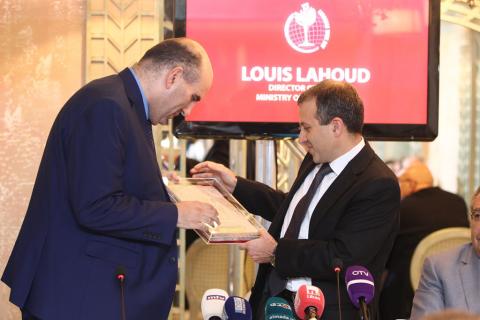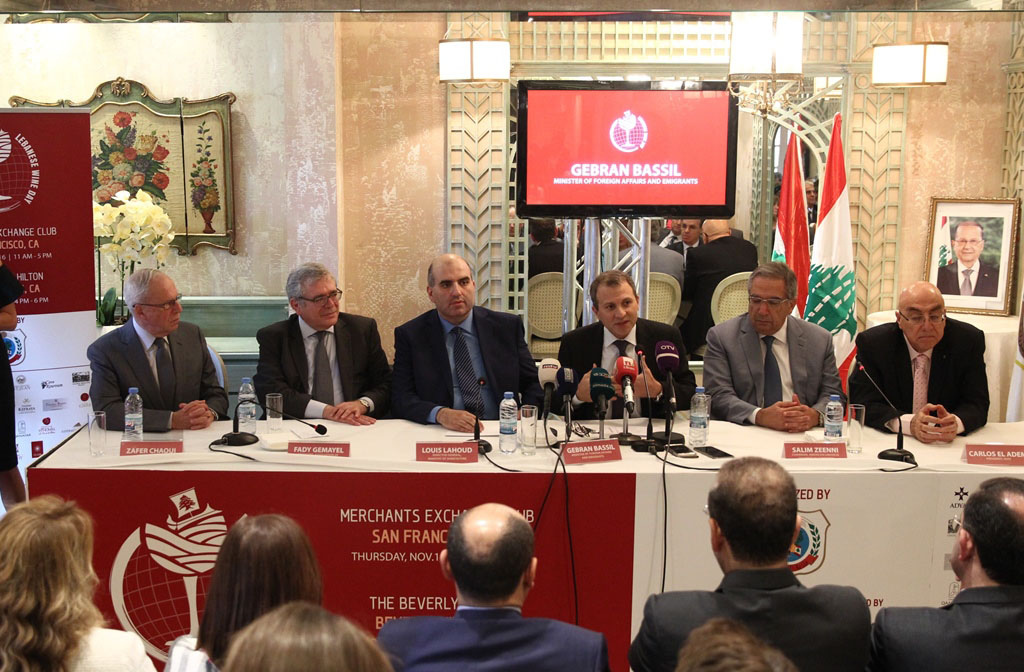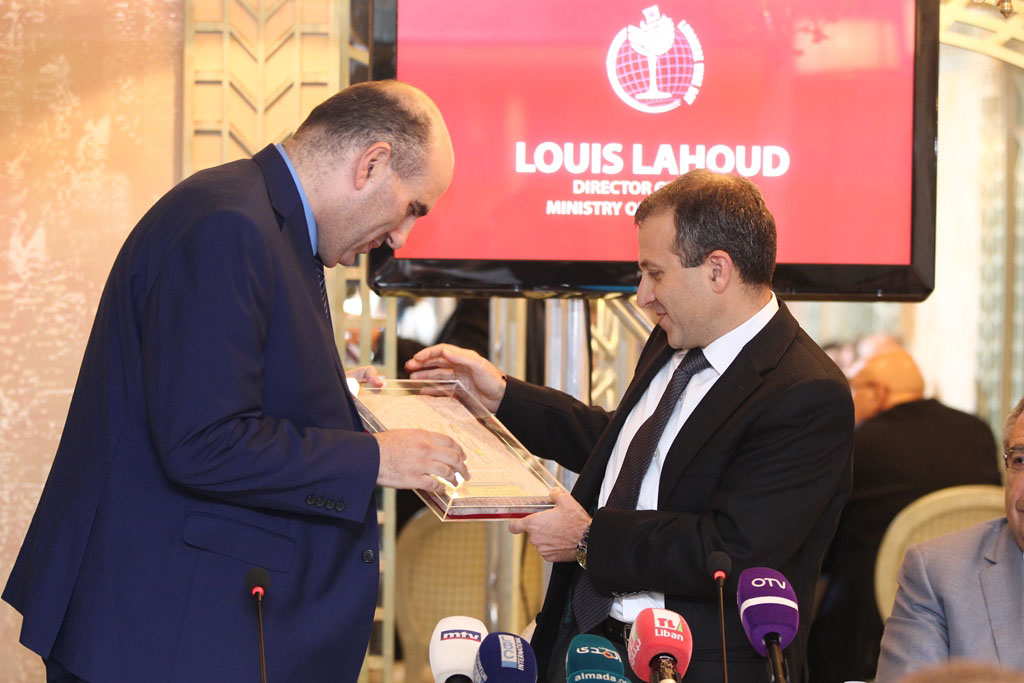
26 companies showcase their products
During the Lebanese Wine Day in California
Gebran Bassil: Lebanon is capable of producing
100 million bottles of wine each year
Louis Lahoud: Next year’s version will be in Russia
Salim Zeenni: we hope to allow Lebanese wineries\to grow and flourish into a fertile US market
Fadi El Gemayel : Lebanon should be specialized in wine production for wine tasters
Zafer El Shawi: The import of foreign wine should be regulated
Carlos El Azem: Modern laws should be put in place in the fields of industry and agriculture
The Lebanese Wine Day, organized by the Lebanese Ministry of Agriculture in partnership with the American Lebanese Chamber of Commerce and managed by Eventions, announced its upcoming winemaker tour in San Francisco and Los Angeles on the 16th and 20th of November, bringing 26 different producers to California to showcase their wines to members of the wine trade.
 At this occasion, the Minister of Foreign Affairs, Gebran Bassil, said at a press conference held on Tuesday at the restaurant “La Table d’Alfred” in Ashrafieh, in the presence of the Minister of Economy Raed Khoury, the Minister of Tourism Avedis Guidanian and the former minister Adel Cortas that “the Lebanese wine is well-known thanks to Lebanon’s particular climate, soil and vine (…), with the Lebanese skills and the warehousing nature, in addition to many other factors, thus making each wine bottle every year special.” He added: “We are proud of the Lebanese wine when we drink it and offer it to our guests. This does not mean that we have the complex of our country and that we do not drink but our wine. When we talk about protection, that does not mean to fully prohibit the import of wine. In fact, Lebanon will always be open to anything.” He noted that “the Lebanese wine is a high-quality, tasty and luxurious product”, which “has largely contributed to the national economy since the economic policy which is presently set up relies mainly on export.” He recalled that there are 14 million Lebanese living abroad, in addition to the Lebanese inhabitants. If each Lebanese living abroad drinks one bottle of Lebanese wine per year, our production will definitely not be sufficient.
At this occasion, the Minister of Foreign Affairs, Gebran Bassil, said at a press conference held on Tuesday at the restaurant “La Table d’Alfred” in Ashrafieh, in the presence of the Minister of Economy Raed Khoury, the Minister of Tourism Avedis Guidanian and the former minister Adel Cortas that “the Lebanese wine is well-known thanks to Lebanon’s particular climate, soil and vine (…), with the Lebanese skills and the warehousing nature, in addition to many other factors, thus making each wine bottle every year special.” He added: “We are proud of the Lebanese wine when we drink it and offer it to our guests. This does not mean that we have the complex of our country and that we do not drink but our wine. When we talk about protection, that does not mean to fully prohibit the import of wine. In fact, Lebanon will always be open to anything.” He noted that “the Lebanese wine is a high-quality, tasty and luxurious product”, which “has largely contributed to the national economy since the economic policy which is presently set up relies mainly on export.” He recalled that there are 14 million Lebanese living abroad, in addition to the Lebanese inhabitants. If each Lebanese living abroad drinks one bottle of Lebanese wine per year, our production will definitely not be sufficient.
We produce 9 million bottles and we have improved our imports by 15% during the past four years.” He added: “Each one of us should know that when he buys a Lebanese wine bottle abroad, he contributes to Lebanese’s agriculture, industry, trade, tourism, culture and economy.”
Bassil insisted that “this sector needs the attention of the State at several levels.” He called to agree within the ministerial economic council “over a series of quick measures to be raised to the Council of Ministers. Such measures shall include measures about Lebanese wine exports, firstly regarding the protection of the national wine production without violating international agreements and without any measure prohibiting the Lebanese from consuming any foreign product. However, at the same time, necessary consumption tariffs are to be levied on foreign products while facilitating all Lebanese exports, particularly wine, through exemptions on income tax and import cost, as well as facilitating and speeding up imports, in addition to taking all necessary measures to this end.” He continued: “There are large markets all over the world we haven’t broken through, such as China, Russia, Brazil and Africa and we are capable of accessing them.”
Bassil proposed to “hold a wine conference in which all concerned sectors take part in drawing a roadmap of the necessary actions to be taken.” He added: “Lebanon shall produce 100 million of wine bottles. It is not a pipe-dream. We used to produce 6 million bottles, have reached 9 million and are capable of producing 100 million, generating henceforth one billion dollars into our economy, creating job opportunities and encouraging tourism, thus creating a real economic resistance.” He continued: “Our wine holds our preferential advantage and is competitive (…). The Lebanese wine may be a great advantage to our economy.” He concluded: “Holding a meeting over Lebanese wine is always a gathering of joy. We say: if you love Lebanon, drink its wine.”

Lahoud
Mr. Louis Lahoud, Director General of the Lebanese Ministry of Agriculture, said that the launching of the Lebanese Wine Day in San Francisco and Los Angeles was a continuation of the plan aiming at developing the wine sector, the Lebanese Ministry of Agriculture has started five years ago, with the support and the cooperation of the private sector in an experience which constituted an example to follow suit to reveal the complementarity between these two sectors, thus contributing to boosting the Lebanese economy and unveiling the cultural and civilizational facet of Lebanon.”
He also welcomed “the converging efforts of all stakeholders in embracing this national industry, reflected at different stages around the globe.” He noted that the Lebanese Wine Day will be held this year in the “global capital of wine” and declared that the next year’s version will be in Russia.”
Moreover, he added that “the Lebanese wine has won an international recognition, granting Lebanon a well-known rank in this regard and a prestigious place on the worldwide map. The efforts deployed by this sector to anchor Lebanon among the main countries of high-quality wine production are well-appreciated. He indicated that “such an appreciation is reflected by the election of Lebanon, through the Director General of the Lebanese Ministry of Agriculture, as the vice-president of the Group for economic analyses and experts within the International Organisation of Vine and Wine. However, he expressed his regret because the Lebanese wine “was still underestimated among the Lebanese people.”
In this context, Lahoud called for “the protection of the Lebanese wine”, which represents a foundation of agro-food industries, asserting that “the Lebanese Ministry of Agriculture will always remain at the forefront to defend the Lebanese production.”
He also asserted that “the success of the Lebanese Wine Days organized by different countries all over the world enabled such an industry to anchor the image of Lebanon, marked by authenticity, history, perseverance, good production and marketing. It also created new and serious opportunities to expand the markets to reach Europe, America and the whole world.” He added that the Ministry “has not stopped at this stage, but supports the launching of the National Institute of Vine and Wine and contributes to alleviating all obstacles preventing the export of the product to the markets of the world.”
He considered that “what was achieved so far wouldn’t have been possible without good will and sincere willingness, starting from the top of the pyramid”, indicating that “the President of the Republic, the Prime Minister, the Government, and the Ministers of Agriculture and Foreign Affairs, since they have provided all what is needed to follow up on this issue, to the working team of the Ministry which has deployed every effort in favor of productive sectors, in parallel with wine production facilities in respecting the norms and producing high-quality wine.”
Zeenni
Mr. Selim Zeenni, the Chairman of the American Lebanese Chamber of Commerce, noted that “Lebanon has produced some of the most renowned brands and talents around the world and has delighted people everywhere with its craft and culinary art. Lebanese Wines have always been at the forefront - bringing great pride to all of us back home.” He considered that such an event opens the doors of the American market for the Lebanese wineries “and creates direct access to the right audience which will eventually be their clientele”. “This purpose lies within the mission of the American Lebanese Chamber of Commerce”, he added. Mr. Zeenni noted that “since the early 90s, the Chamber has always been, promoting the Lebanese success stories – and ultimately the international image of Lebanon.” He added that the Chamber’s recent Caravan Beirut in Washington DC (…) and the very successful and innovative startup Lebanon in 2015 and 2016, are sheer examples in this sense. The 3rd edition of startup Lebanon, planned for April 2018, “will focus on the future of innovation within Corporations”, he revealed. He concluded: “whatever the sector is, given the right type of support and with initiatives like these, we are building sturdy bridges between Lebanon and the United States. In November, we hope to allow already established as well as younger wineries to grow and flourish beyond their Lebanese borders and into a fertile market that is craving a taste of the east”.
Gemayel
Mr. Fady Gemayel, the President of the Association of Lebanese Industrialists, described the wine sector as “a special sector with a prestigious past and a promising future”. He also considered the Lebanese wine as “the ambassador of Lebanon abroad” and linked it to emigration. According to him, wine has given Lebanon a shining image once it has started to become known on international markets.” He explained that “wine industry requires patience and a commitment to quality throughout the years and characterizes the advantages of the Lebanese industry.” He added: “It is true that we cannot compete with large production. However, this industry has to tend towards high quality. Therefore, Lebanon has to become specialized in wine industry for tasters.” He recalled that “Lebanese wine producers have taken several initiatives in this field, among which creating the Institute of Wine. They also take part in the most important international exhibitions and achieve well-known successes. Today, the Lebanese Wine Day 2017 kicks off in San Francisco and Los Angeles.”
El Shawi
Mr. Zafer Chaoui, the President of the Vine and Wine Federation, considered that such an event contributed to “enhancing the role of Lebanon as a distinguished wine producer “, noting that the Lebanese wine was competing with other best quality products and raising Lebanon’s flag high in more than thirty countries.” He indicated that “the Ministry of Agriculture has chosen California this year out of its conviction that the Lebanese wine competes with the Napa Valley wine and has a deep-rooted place in the well-known American state.” He also said that “Lebanon, with its soil and climate and with the cooperation and the expertise of its wine producers, is considered among the best producing countries in terms of quality, despite the limited produced quantity.” He called upon the Ministry of Agriculture and other ministries to “regulate the import of foreign wine as it is the case in most countries of the world.” He also called for the “promotion of the role of the National Institute of Wine and for the promulgation of necessary decrees in this regard.”
El Azem
Carlos El Azem, the President of the National Institute of Vine and Wine, said that the Lebanese wine is “known for its quality and its singularity in the most important global competitions and exhibitions”, noting that “many Lebanese wine producers seek to expand.” He added: “Despite the multiple successes of this industry, we still have much to do, to anchor solid foundations and modern laws in the fields of agriculture and industry, in cooperation with the Lebanese Institute of Vine and Wine and the concerned ministries.” He hoped that the event held in San Francisco and Los Angeles will “raise the flag of Lebanese wine in the United States beside the Lebanese flag.”
The program
The first Lebanese Wine Day will take place in San Francisco on the afternoon of November 16 at the historic Merchants Exchange Club (Leidesdorff street – San Francisco) , a recently renovated event space located in the Financial District. The day will begin with a master class presented by Jean Reilly, Master of Wine and renowned wine speaker. A walk-around wine tasting will be running concurrently, where guests will have the opportunity to taste the wines and meet face to face with winemakers and representatives from the Lebanese government. A second master class will also be held in the afternoon.
Following the Lebanese Wine Day in San Francisco, the producers will head to Los Angeles, where they will offer their wines for walk around tasting on Monday, November 20 at the Beverly Hilton Hotel (Wilshire Blvd- Beverely Hill), where the Lebanese Consul Johnny Ibrahim will also be hosting a celebration on the occasion of the Lebanese Independence Day.
It is noteworthy that the first edition was organized in Paris, in Berlin in May 2014, then in New York in November 2016.
Categories
- Log in to post comments